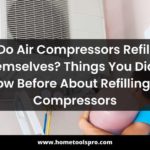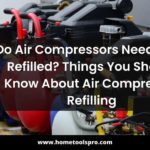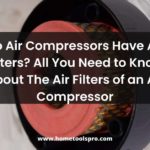As a mechanical engineer, I have always been fascinated by the intricacies of machinery. However, one thing that has always puzzled me is why air compressors are so loud. It seems that no matter where you go, whether it’s a construction site or an auto repair shop, the sound of an air compressor can be heard from miles away.
As someone who takes pride in understanding how things work, I decided to dive deep into the science behind air compressor noise and explore why they generate such high levels of sound. The answer to this question lies in the very nature of how air compressors operate.
At their core, these machines essentially take air molecules and pack them tightly together to create compressed air. This process involves a lot of moving parts – pistons, valves, and pressure regulators – all working together in a coordinated effort. While this results in powerful output force for various applications like painting or drilling holes into walls; unfortunately it also generates significant amounts of noise due to vibrations caused by these movements.
In this article, we will explore various factors that contribute to high noise levels generated by air compressors and what can be done about it.
Introduction to Air Compressor Noise
You’re about to learn why that whirring, buzzing sound fills your ears whenever you turn on that machine. Air compressors are loud because of the way they work. The motor in an air compressor powers a piston that moves up and down inside a cylinder. This piston compresses air, which is then stored in a tank until it’s needed.
The noise comes from two sources: the motor and the compressor itself. The motor generates noise because of its moving parts and electrical components. As for the compressor, the sound is caused by the release of compressed air when it exits the tank or moves through hoses and valves.
In addition to these factors, there are other variables that affect how loud an air compressor is, such as its size, design, and materials used in construction. However, now that we know what causes this noise, let’s take a look at some of the science behind it and see if there’s anything we can do to reduce it without compromising performance.
The Science Behind Air Compressor Noise
The cacophony emanating from the device can be attributed to the rapid vibrations and collisions of various mechanical parts within. As air is drawn into the compressor, it passes through an intake valve and is then compressed by a piston or other means.
This compression process generates intense pressure that ultimately results in the release of compressed air at high speeds. However, this process also generates significant noise levels due to the mechanical movements involved.
The piston moving up and down creates vibration, which causes other components such as valves and piping to vibrate as well. These vibrations create sound waves that propagate through the surrounding air, resulting in loud noise levels. Furthermore, some compressors have additional components such as fans or motors that contribute to the overall noise level.
These elements also generate their own vibrations and sounds that add to the already noisy environment created by the compression process. It’s important for users of air compressors to understand these mechanisms in order to take appropriate measures to reduce noise levels where possible.
Moving on from understanding how these devices produce sound, it’s worth noting that certain types of air compressors are inherently louder than others due to their design or construction materials. In particular, reciprocating (piston-driven) compressors tend to generate more noise than rotary screw compressors due to their greater number of moving parts and less efficient compression processes.
Other factors such as operating speed and power source can also impact overall noise levels generated by an air compressor system.
Types of Air Compressors That Generate High Noise Levels
If you’re looking to minimize the noise levels of your compressor system, it would be wise to identify and avoid reciprocating compressors as they tend to generate higher decibel levels due to their complex mechanical design and less efficient compression processes. Reciprocating compressors use a piston that moves back and forth inside a cylinder to compress air. As the piston moves, it creates a lot of vibration that can cause noise.
Additionally, these types of compressors have multiple moving parts which can contribute to the overall sound level. Rotary screw compressors are another type of air compressor that can generate high noise levels. These machines use two interlocking screws to compress air instead of a piston.
While rotary screw compressors are generally quieter than reciprocating ones, they still produce significant amounts of noise due to their high rotational speeds and metal-to-metal contact between the screws. Centrifugal compressors are typically the quietest type of air compressor available on the market because they operate using impellers instead of pistons or screws.
Centrifugal compressors work by accelerating incoming air with an impeller and then diffusing it through a stationary component called a diffuser. This process produces less vibration and less noise than other types of air compressors. However, centrifugal models tend to be more expensive compared with other types due to their advanced design features that help reduce overall noise levels.
As we’ve seen, different types of air compressors have varying degrees of noise output based on their mechanical design and operational processes. In our next section, we’ll explore some specific design features that affect how loud an air compressor is, in order to help you make an informed decision when choosing one for your needs without sacrificing performance or efficiency.
Design Features That Affect Noise Level
When it comes to minimizing the noise level of your compressor system, there are specific design features that you should consider. One key factor is the size and shape of the air tank. A larger tank can reduce noise by allowing for longer periods of rest between air compressions, while a cylindrical tank will produce less noise than a rectangular one due to its rounded edges.
Another important design feature is the type of compressor pump used in your system. Reciprocating pumps tend to be louder than rotary screw or centrifugal pumps due to their high-speed operation and use of pistons. However, newer models with advanced sound insulation materials can significantly reduce noise levels without sacrificing performance.
But have you ever wondered if sacrificing noise reduction is worth the cost savings? While quieter systems may come at a higher price point, they offer benefits beyond just reduced noise pollution. Quieter compressors are often more efficient and have a longer lifespan due to lower wear and tear on components from excessive vibration and friction.
As we delve deeper into understanding how air compressors generate sound, it’s important to consider motor types and their impact on overall noise level. Different types of motors can produce varying levels of decibels depending on factors such as horsepower rating, speed range, and cooling method.
In our next section, we’ll explore these differences in more detail and provide insights on how to choose a motor that fits both your application needs and desired sound output.
Motor Types and Noise Level
Now that you’ve learned how specific design features affect noise level, let’s explore the impact of different motor types on the sound output of your compressor system.
The type of motor used in an air compressor can significantly influence its noise level. A reciprocating or piston motor is one of the most common motor types found in compressors. These motors tend to be quite loud because they push and pull pistons to generate compressed air, which creates a lot of vibration and noise.
In contrast, rotary screw compressors use a different type of motor that operates more quietly. Instead of using pistons, they use two helical screws that rotate in opposite directions to compress air. This motion produces far less vibration compared to reciprocating motors, resulting in quieter operation overall. In addition, these motors are typically designed with sound-dampening materials around them to reduce noise even further.
When selecting an air compressor for your needs, it’s important to take into consideration the type of motor being used and its potential impact on noise level. While rotary screw compressors may cost more initially than their reciprocating counterparts, they offer a quieter operating experience and can provide significant long-term savings through reduced maintenance costs and increased energy efficiency.
As we’ve seen, understanding the various types of motors available for air compressors is essential when trying to mitigate excess noise levels. However, there are other solutions available for those who want to reduce their compressor’s volume even further.
In our next section, we’ll look at some practical strategies you can implement today for reducing unwanted noise from your air compressor system without sacrificing performance or reliability.
Solutions for Reducing Air Compressor Noise
You can reduce the noise level of your compressor system by implementing practical solutions that won’t sacrifice performance or reliability. One effective way to do this is by installing a soundproof enclosure around the compressor unit. This can significantly reduce noise levels while also protecting the components from external factors such as moisture and dust.
Another solution is to replace noisy components with quieter ones, such as using a belt-driven compressor instead of a direct drive one. Additionally, regularly maintaining and lubricating the system can help prevent unnecessary noise caused by wear and tear on moving parts.
Lastly, consider investing in vibration isolation pads to minimize vibrations that can cause unwanted noise. These pads absorb shock and prevent excessive movement of the compressor unit, resulting in reduced noise levels overall.
By taking these steps, you can enjoy all the benefits of an air compressor without having to deal with excessive noise levels in your workspace or home.
As we’ve seen, there are several practical solutions for reducing air compressor noise without sacrificing performance or reliability. Whether it’s installing a soundproof enclosure, replacing noisy components with quieter ones, or investing in vibration isolation pads, there are ways to achieve a quieter working environment with minimal effort.
By taking these steps, you can enjoy all the benefits of an air compressor system while creating a more comfortable working environment for yourself and those around you.
Conclusion and Final Thoughts
To wrap up, it’s important to remember that excessive noise levels in any environment can have a negative impact on our health and well-being. Air compressors are no exception to this rule, with their loud noises often causing stress, anxiety, and even hearing loss over time. It’s crucial for manufacturers and users alike to take steps towards reducing the noise created by these machines.
One solution for reducing air compressor noise is to invest in quieter models or accessories such as mufflers or soundproof enclosures. Another option is to place the compressor in a separate room or area away from regular traffic flow. However, it’s important to note that while these solutions may help reduce the decibel level of an air compressor, they may not completely eliminate all noise.
In conclusion, it’s clear that addressing air compressor noise is an important issue for both personal health and workplace productivity. By taking proactive measures towards reducing excessive noise levels, we can create a safer and more comfortable environment for ourselves and those around us. Whether through investing in quieter equipment or implementing soundproofing techniques, every step taken towards reducing air compressor noise makes a difference.
Conclusion
In conclusion, after diving into the science behind air compressor noise and exploring the various factors that contribute to high noise levels, it’s clear that there are solutions available to reduce excessive noise.
As I mentioned earlier, some of these solutions include using soundproof enclosures or barriers, opting for oil-free compressors, and choosing a motor type that operates at a lower decibel level.
While air compressors may never be completely silent, these options can significantly decrease the amount of noise emitted during operation.
So next time you’re in need of an air compressor for your garage or workshop, keep in mind the design features and motor types that can help reduce unwanted noise – after all, no one wants to be ‘that guy’ with the noisy compressor disrupting the neighborhood peace!


